Related Research Articles
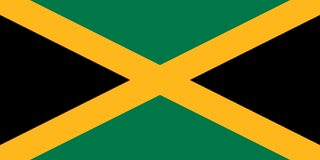
Jamaica is an island country in the Caribbean Sea and the West Indies. At 10,990 square kilometres (4,240 sq mi), it is the third largest island—after Cuba and Hispaniola—of the Greater Antilles and the Caribbean. Jamaica lies about 145 km (90 mi) south of Cuba, 191 km (119 mi) west of Hispaniola, and 215 km (134 mi) south-east of the Cayman Islands.

The Caribbean Island of Jamaica was initially inhabited in approximately 600 AD or 650 AD by the Redware people, often associated with redware pottery. By roughly 800 AD, a second wave of inhabitants occurred by the Arawak tribes, including the Tainos, prior to the arrival of Columbus in 1494. Early inhabitants of Jamaica named the land "Xaymaca", meaning "land of wood and water". The Spanish enslaved the Arawak, who were ravaged further by diseases that the Spanish brought with them. Early historians believe that by 1602, the Arawak-speaking Taino tribes were extinct. However, some of the Taino escaped into the forested mountains of the interior, where they mixed with runaway African slaves, and survived free from first Spanish, and then English, rule.

Michael Norman Manley was a Jamaican politician who served as the fourth prime minister of Jamaica from 1972 to 1980 and from 1989 to 1992. Manley championed a democratic socialist program, and has been described as a populist. He remains one of Jamaica's most popular prime ministers.
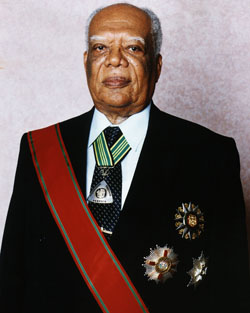
Sir Howard Felix Hanlan Cooke served as the fourth governor-general of Jamaica from 1 August 1991 to 15 February 2006.

Sir William Alexander Clarke Bustamante was a Jamaican politician and labour leader, who, in 1962, became the first prime minister of Jamaica.
The Jamaica Labour Party is one of the two major political parties in Jamaica, the other being the People's National Party (PNP). While its name might suggest that it is a social democratic party, the JLP is actually a conservative party.
Roger Mais was a Jamaican journalist, novelist, poet, and playwright. He was born to a middle-class family in Kingston, Jamaica. By 1951, he had won ten first prizes in West Indian literary competitions. His integral role in the development of political and cultural nationalism is evidenced in his being awarded the high honour of the Order of Jamaica in 1978.
The history of journalism spans the growth of technology and trade, marked by the advent of specialized techniques for gathering and disseminating information on a regular basis that has caused, as one history of journalism surmises, the steady increase of "the scope of news available to us and the speed with which it is transmitted". Before the printing press was invented, word of mouth was the primary source of news. Returning merchants, sailors, travelers brought news back to the mainland, and this was then picked up by pedlars and traveling players and spread from town to town. Ancient scribes often wrote this information down. This transmission of news was highly unreliable and died out with the invention of the printing press. Newspapers have always been the primary medium of journalists since the 18th century, radio and television in the 20th century, and the Internet in the 21st century.
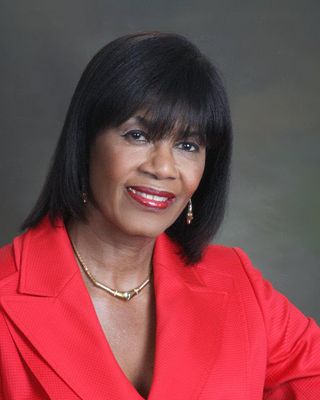
Portia Lucretia Simpson-Miller is a Jamaican former politician. She served as Prime Minister of Jamaica from March 2006 to September 2007 and again from 5 January 2012 to 3 March 2016. She was the leader of the People's National Party from 2005 to 2017 and the Leader of the Opposition twice, from 2007 to 2012 and from 2016 to 2017.

General elections were held in Jamaica on 9 February 1989. The result was a victory for the People's National Party, which won 45 of the 60 seats. Voter turnout was 78%.
Louis Marriott was a Jamaican actor, director, writer, broadcaster, the executive officer of the Michael Manley Foundation, and member of the Performing Right Society, Jamaica Federation of Musicians, and founding member of the Jamaica Association of Dramatic Artists.

Phillippo Baptist Church is a Baptist church in Spanish Town, Jamaica.

Kenneth Wykeham McNeill, MD, MP, CD is a Jamaican politician and former Member of Parliament for Westmoreland West, Jamaica. He is a former government minister. He was the Minister of Tourism of Jamaica from 2012 to 2016. He was elected the first vice chair of the Executive Council of the United Nations World Tourism Organization representing Jamaica in 2012 and elected chairman of the Executive council for the 2014-2015 period. McNeill was elected a Vice President of The People's National Party at the Party's annual conference in September 2016.

The Crown Colony of Jamaica and Dependencies was a British colony from 1655, when it was captured by the English Protectorate from the Spanish Empire. Jamaica became a British colony from 1707 and a Crown colony in 1866. The Colony was primarily used for sugarcane production, and experienced many slave rebellions over the course of British rule. Jamaica was granted independence in 1962.
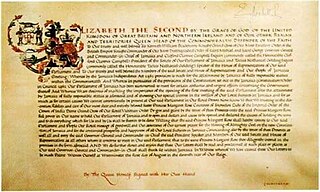
The Colony of Jamaica gained independence from the United Kingdom on 6 August 1962. In Jamaica, this date is celebrated as Independence Day, a national holiday.

The Independence Day of Jamaica is a national holiday celebrated in Jamaica. This holiday commemorates such an event, it is one of the most senior public holidays celebrated in Jamaica.
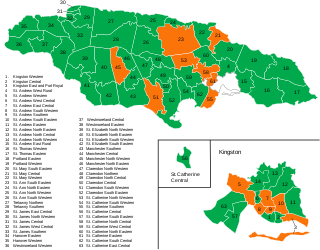
General elections were held in Jamaica on Thursday, 3 September 2020 to elect 63 members of Parliament. As the constitution stipulates a five-year parliamentary term, the next elections were not expected until between 25 February and 10 June 2021. However, Prime Minister Andrew Holness called early elections to ensure a united response to the ongoing COVID-19 pandemic. On the advice of Holness, Governor General Patrick Allen dissolved Parliament on 13 August 2020.
Edward Jordon (1800–1869), or Edward Jordan, was a leading campaigner for equal rights for free people of color in Jamaica during the nineteenth century.
Free black people in Jamaica fell into two categories. Some secured their freedom officially, and lived within the slave communities of the Colony of Jamaica. Others ran away from slavery, and formed independent communities in the forested mountains of the interior. This latter group included the Jamaican Maroons, and subsequent fugitives from the sugar and coffee plantations of coastal Jamaica.
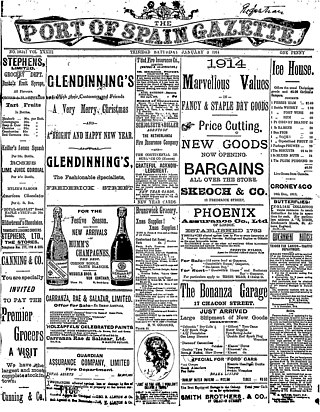
The Port of Spain Gazette was a newspaper based in Port of Spain, Trinidad between 1825 and 1959. The paper took a proslavery position in the 1830s, and later supported the rights of local elites against the Crown colony government. In the twentieth century the paper supported the government and opposed the labour movement.
References
- ↑ Michael Siva, After the Treaties: A Social, Economic and Demographic History of Maroon Society in Jamaica, 1739-1842, PhD Dissertation (Southampton: Southampton University, 2018), p. 279.
- ↑ "Edward Jordon". Jamaica's history - always something new to find out!. Retrieved 9 January 2019.
- ↑ "The Story Of The Gleaner Company". Digjamiaca.com. Archived from the original on 2 March 2019. Retrieved 9 January 2019.
- ↑ Ewart Walters, We Come From Jamaica: The National Movement, 1937-1962 (Ottawa: Boyd McRubie, 2014), pp. 65-69.
- ↑ Walters, We Come From Jamaica, pp. 69-70.
- ↑ Walters, We Come From Jamaica, pp. 70-73.
